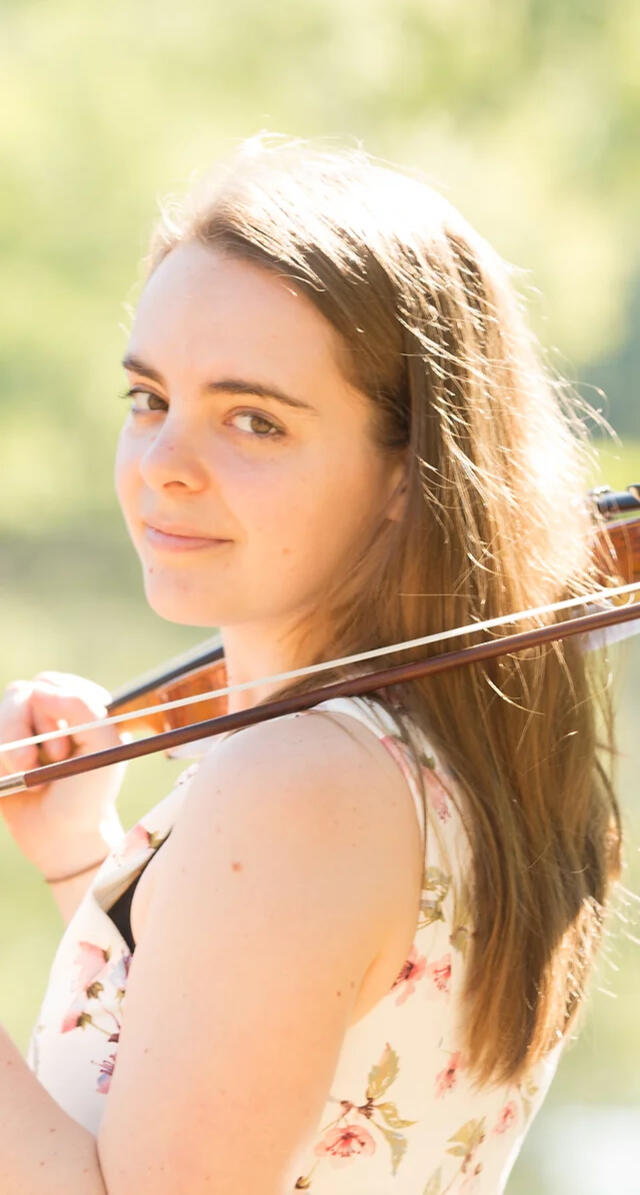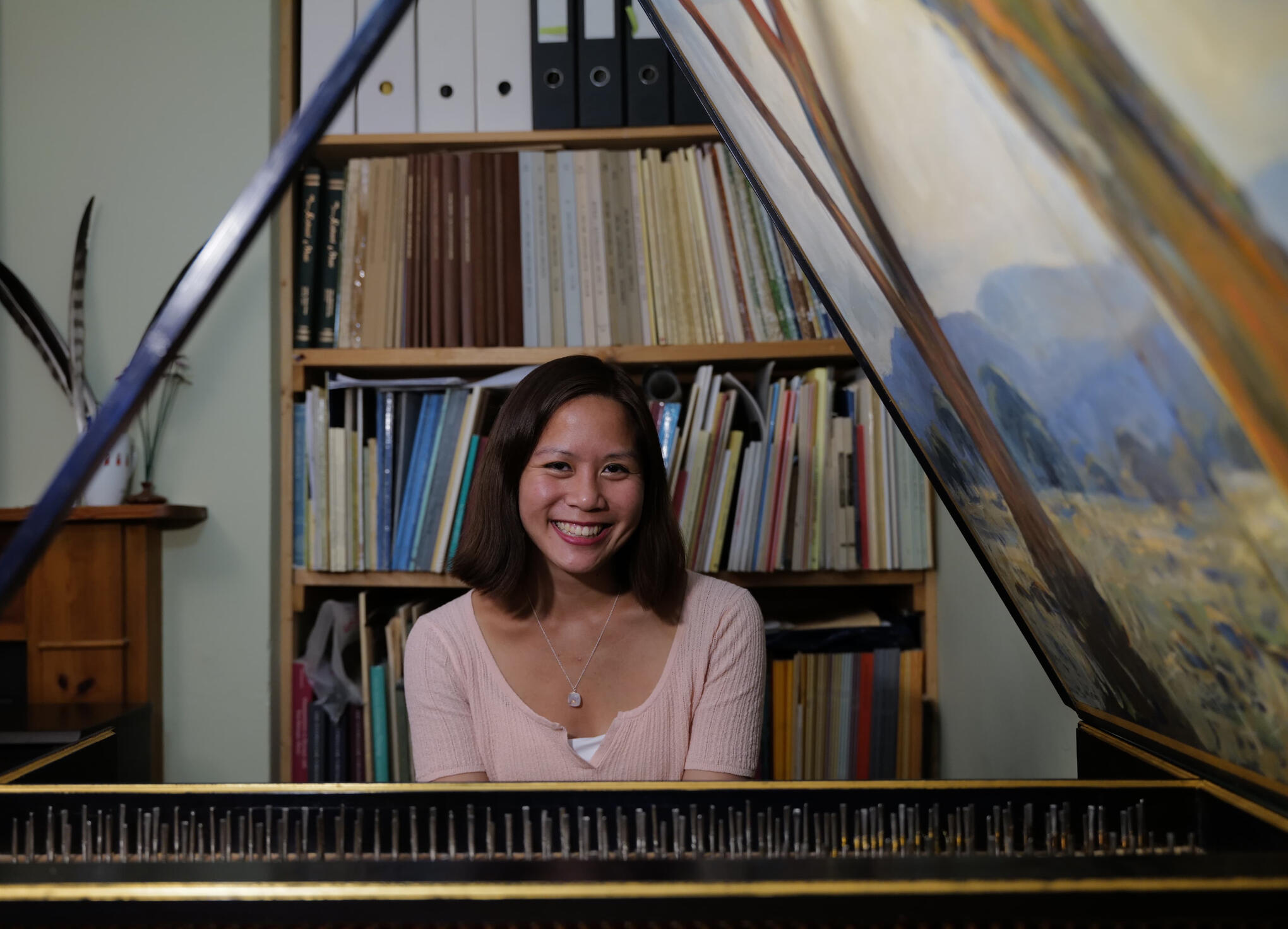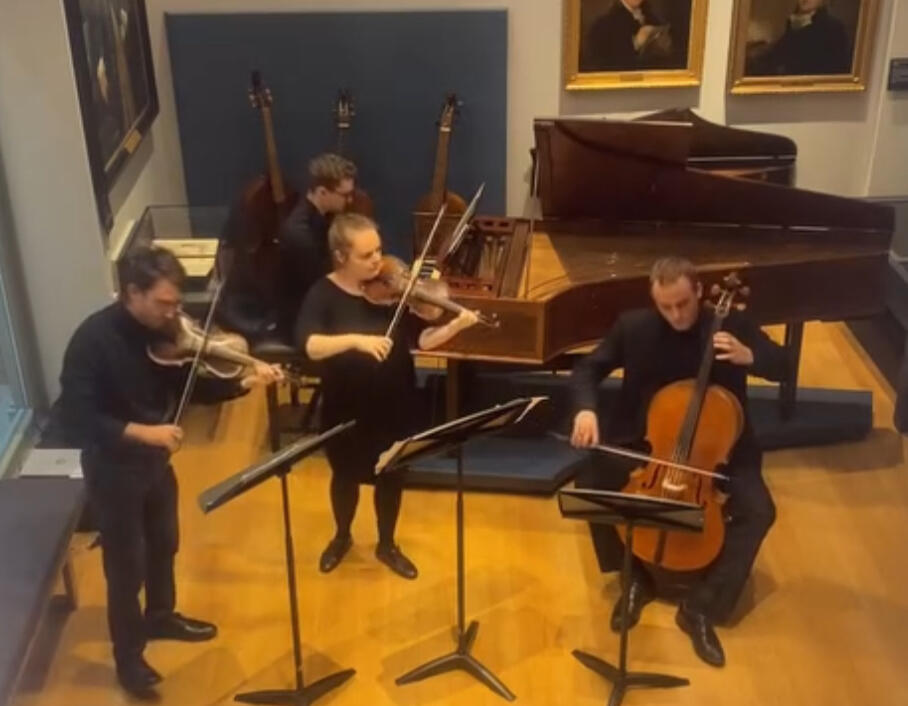
Our Name
Choosing a name can be an arduous task - you need to choose something memorable and creative, yet, not too obscure...is our name too surprising? Maybe!
G.F Handel was nicknamed “the Great Bear” due to his great stature and leering disposition. We don’t aim to “let loose (our) great bear”, but we hope you find our name playful and memorable.
About
The Great Bear Ensemble is a HP ensemble consisting of postgraduate and doctoral students from the Royal College of Music and the Guildhall School of Music and Drama in London. Hailing from the United States, Australia, and the United Kingdom, we bring together a wealth of experiences and backgrounds. Together, we combine a knowledge and understanding of historically informed performance practise with a desire to innovate and recreate the great works of the past in a way that is dynamic and relevant to today’s audience.
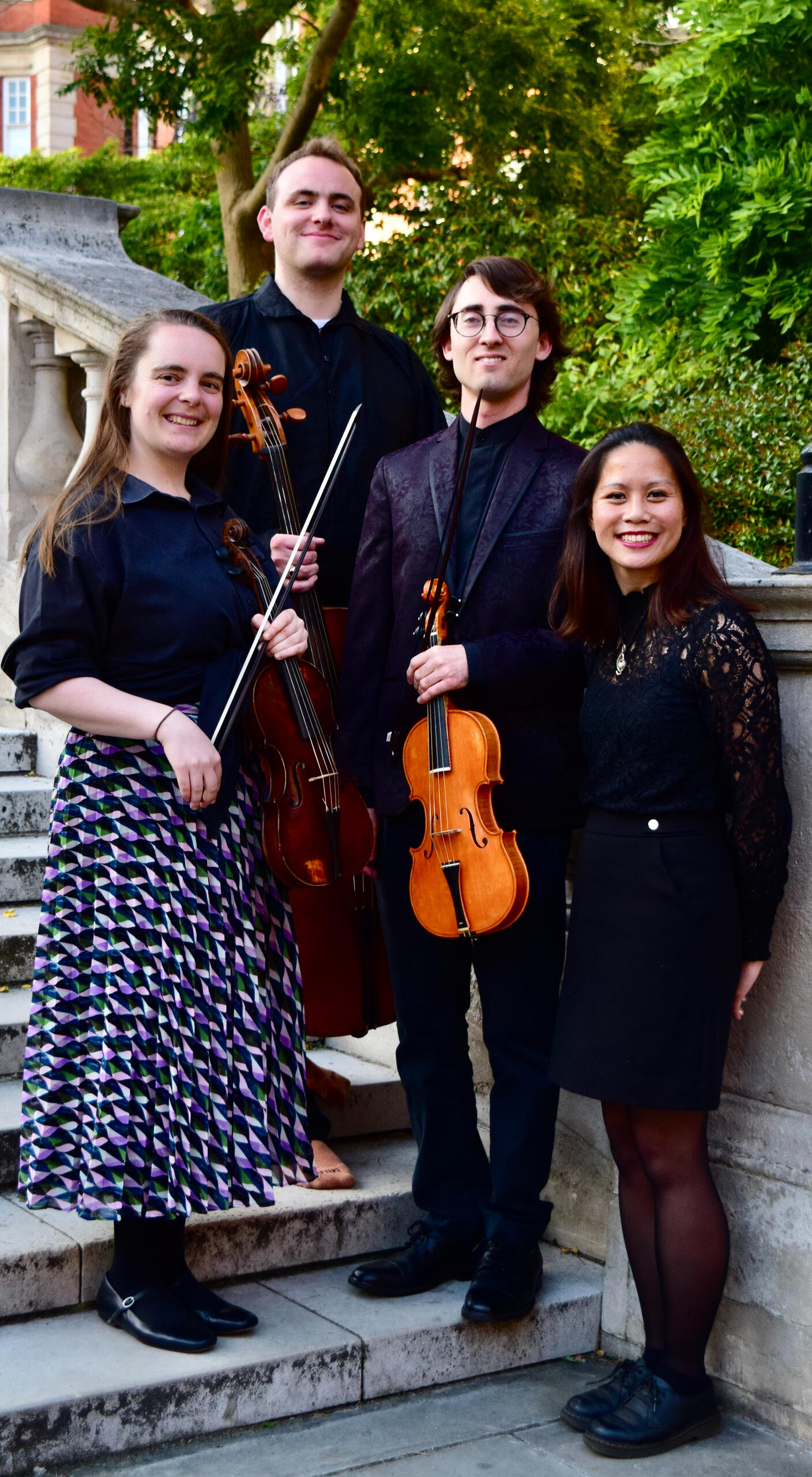
FAQs
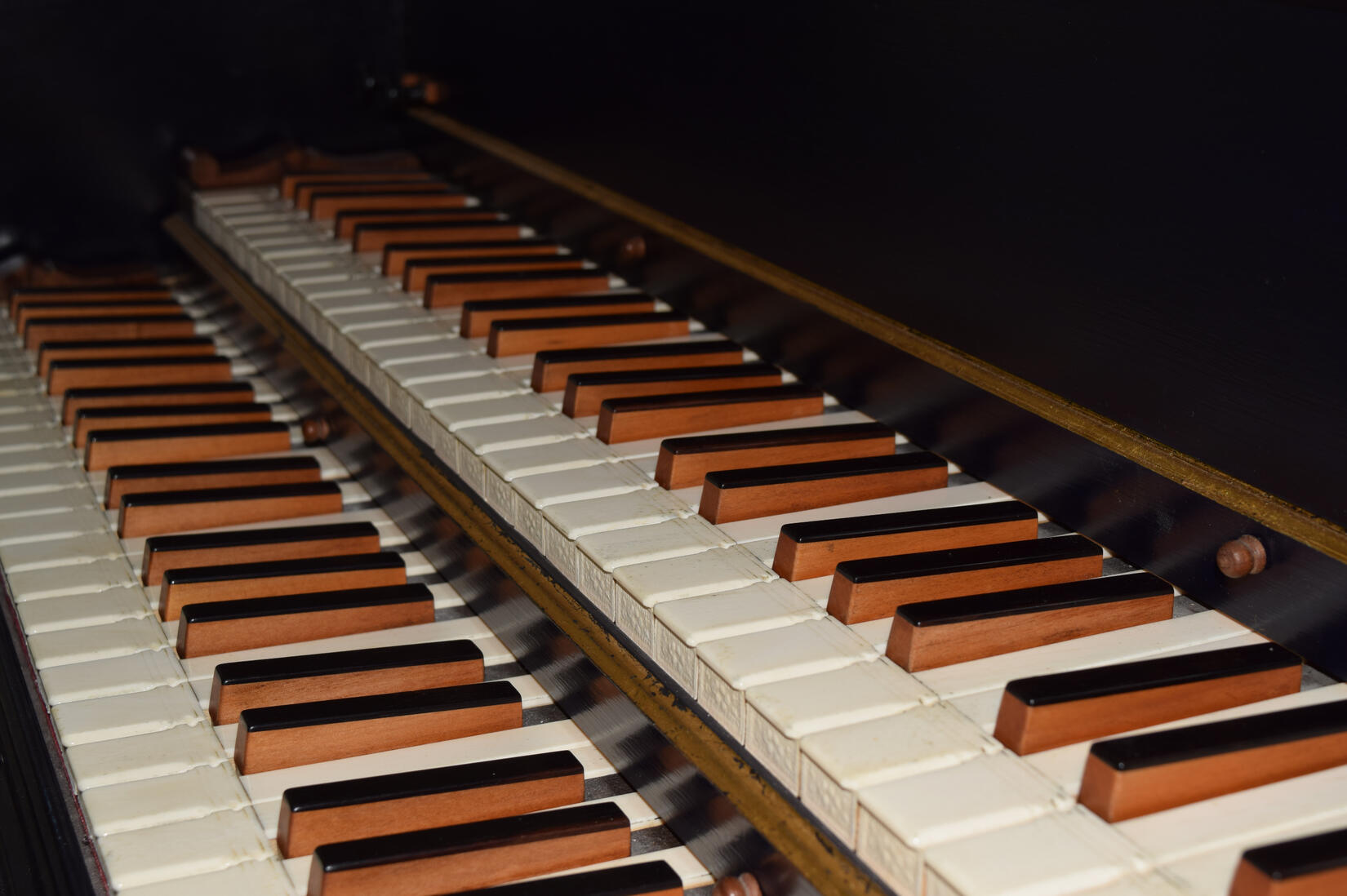
One unique feature of the Great Bear Ensemble is our simultaneous use of two keyboard continuo instruments. Today, it is common practice, when performing Baroque chamber music, to use only a single keyboard continuo instrument, often in combination with bowed bass and occasionally lute or theorbo: usually organ for sacred music or sonatas da chiesa, and harpsichord for secular music or sonatas da camera.The historical sources, however, indicate that the instrumentation of the basso continuo group was often much more flexible than previously thought. Agostino Agazzari, in his 1607 treatise, Del sonare sopra'l basso con tutti li stromenti, explains a system in which “foundational” instruments (such as the organ) provided the harmonic foundation for the music, while “ornamental” instruments (such as the spinet) render the harmony more pleasing and sonorous. This practice of combining harpsichord and organ was echoed a century later in two works by the German composer, critic, lexicographer and music theorist, Johann Mattheson: Das neu-eroffnete Orchestre (Hamburg, 1713) and Der vollkommene Capellmeister (Hamburg, 1739). In these works, Mattheson makes the case that a harpsichord could be combined with a chamber organ (or even with a second harpsichord) to make a versatile accompanying instrument.The use of multiple keyboard instruments within the same ensemble is confirmed by surviving inventories detailing the musical instruments owned by churches and courts. For example, personal property inventories of aristocratic homes, such as the Florentine court, frequently included wooden organs and claviorgans alongside harpsichords and spinets. There was also a tradition for claviorgans in churches, such as the 1639 claviorgan once used in a church near Salzburg. Such an instrument would have been able to serve both foundational and ornamentatal functions through its three organ stops and two harpsichord ranks. By Mattheson’s time, it was common for churches to own both an organ and a harpsichord. The Thomaskirche in Leipzig, for example, is known to have had a harpsichord situated in the west-end gallery during the tenure of J. S. Bach. We at the Great Bear Ensemble feel that the dual-keyboard configuration is particularly suitable to the performance of solo and chamber music, as the absence of inner voices allows for a great amount of creativity, flexibility, and variety in filling out the harmonies and textures. We are constantly trying to find new ways to implement these vast possibilities in our own performances.
Short bibliographyAgazzari, Agostino. Del sonare sopra'l basso con tutti li stromenti (Siena: Domenico Falconi, 1607).Hammond, Frederick. “Musical Instruments at the Medici Court in the Mid-Seventeenth Century." Analecta Musicologica, 15 (1975): 202-219.Mattheson, Johann. Das neu-eröffnete Orchestre (Hamburg: B. Schiller, 1713)Mattheson, Johann. Der vollkommene Capellmeister (Hamburg: Christian Herold, 1739)Arnaldo Morelli. “Basso Continuo on the Organ in Seventeenth-Century Italian Music.” Basler Jahrbuch für Historische Musikpraxis, XVIII (1994): 31-45.Williams, Peter. “Basso Continuo on the Organ, II.” Music & Letters 50, no. 2 (1969): 230–45.
The Great Bear Ensemble
Members
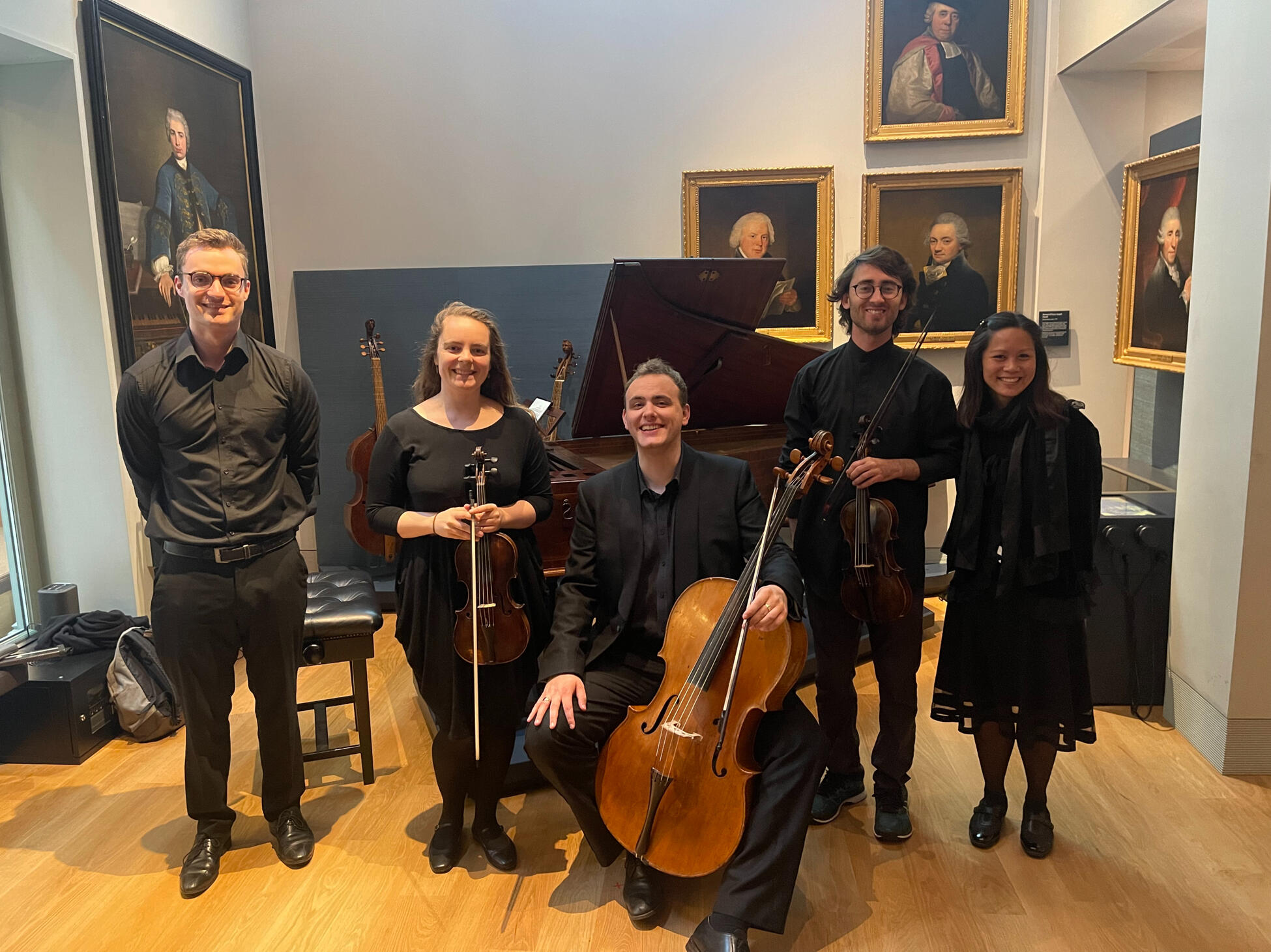
Francine Maas, violin
Matthew Millkey, violin
Theo Tinkler, cello
Kiele Sacco, keyboard
Thomas Dilley, keyboard
Francine Maas, violin
Australian born, Francine is completing her Masters in Performance at the Royal College of Music, specialising in historical and modern violin under the tutelage of Bojan Cicic, Yuri Zhislin, and Joshua Fisher. Prior to this she also studied at the University of Cambridge, the Royal Conservatoire of The Hague, and the University of Melbourne. Having specialised in both modern and period instruments, Francine brings a unique perspective to the specific technicalities required of certain repertoires, and an understanding of historical context.Since moving to the U.K. in 2018 she has performed with Norwich Baroque, Bury Baroque, the Cambridge Collegium, Voces8, and the Academy of Ancient Music, as well as performing a solo recital series at Murray Edwards and Churchill Colleges in Cambridge. Recent highlights have included solo performances of Vivaldi’s Autumn from the Four Seasons at the Bedford Music Festival and Tilford Music Festival, as well as a collaborative project with the Mozarteum in Salzburg. She has also participated with numerous projects and masterclasses with performers and pedagogues such as Rachel Podger, Matthew Truscott, Lucy Russell, Adrian Butterfield, Lucy van Dael, and Margaret Faultless. She performs on an original 18th century Benjamin Banks instrument.
Matthew Millkey, violin
British-American Baroque violinist, Matthew Millkey, is a graduate of Oberlin Conservatory of Music and Indiana University’s Jacobs School of Music. He has preformed with numerous Early Music ensembles around England, including the Academy of Ancient Music, Florilegium, the BBC Singers, Endelienta Baroque (as a guest principal player), Noxwode Baroque, and Ensemble OrQuesta. Matthew has participated in multiple live radio broadcasts on BBC Radio 3, and has appeared in music festivals including the Boston Early Music Festival, the Oregon Bach Festival, and the Tilford Bach Festival. As a modern violinist, Matthew has performed with orchestras including the Evansville Philharmonic, Owensboro Symphony, and Richmond Symphony. Matthew is also currently a PhD candidate at the Royal College of Music, where his research investigates violin technique in the period 1630-1700, specifically the practice of holding the violin against the chest. Matthew plays on a Baroque violin by Hugh Saville, kindly on loan to him from the Royal College of Music.
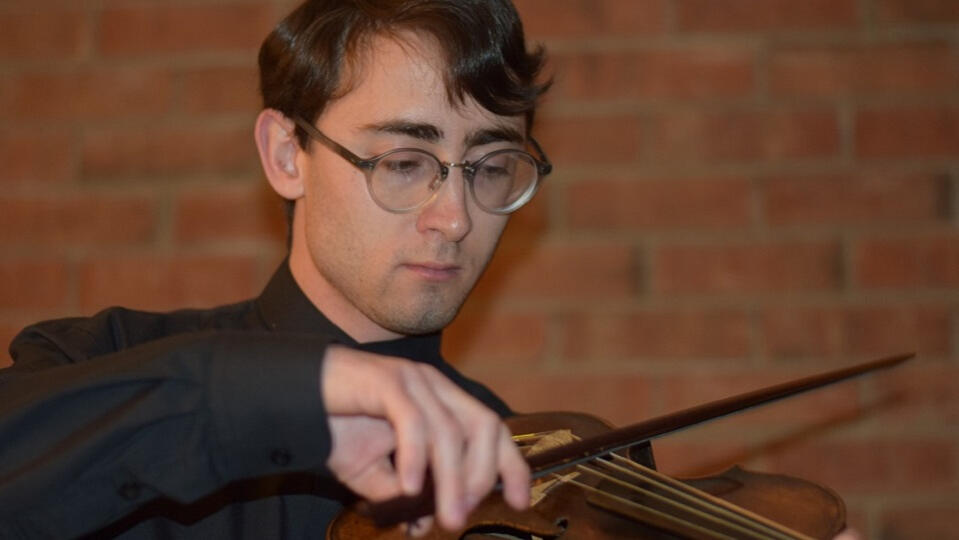
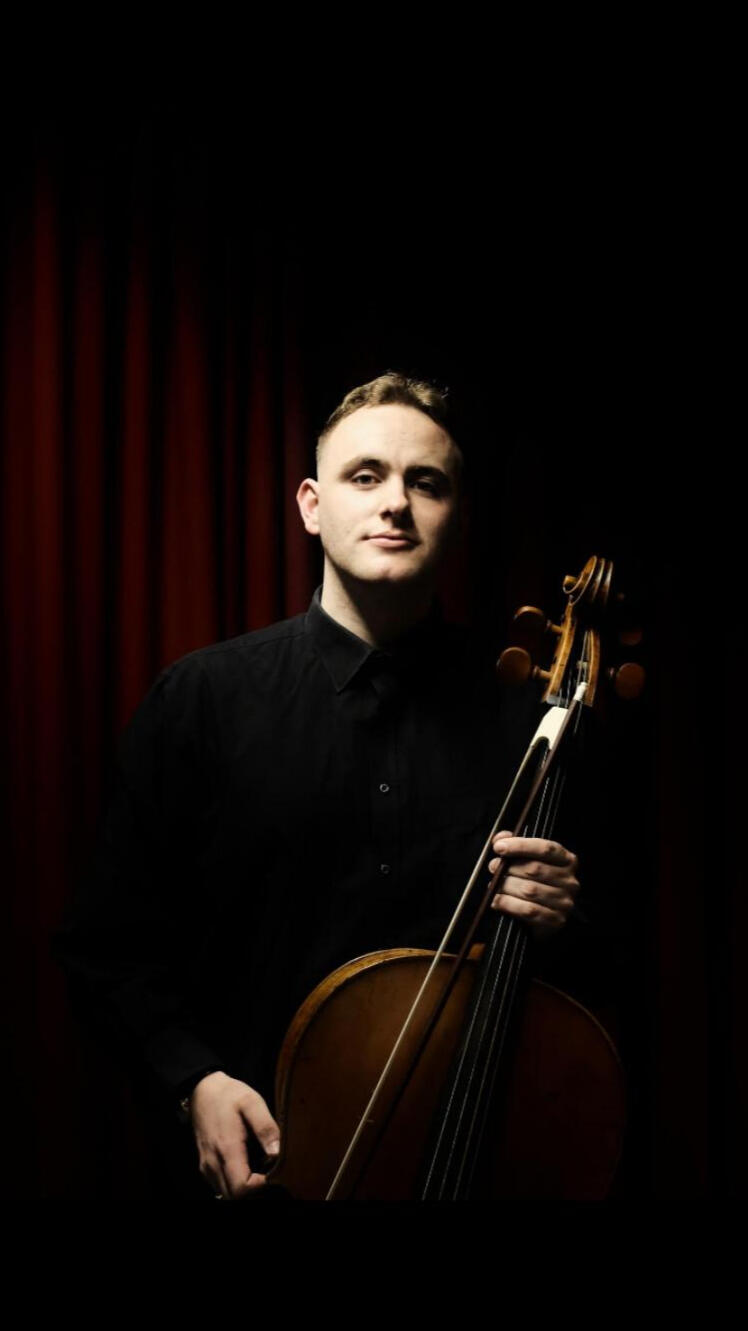
Theo Tinkler, cello
Theo Tinkler grew up in Cambridge and graduated with a BMus (Hons) in cello performance from the Royal Conservatoire of Scotland, where he studied with Professor David Watkin and Robert Irvine. Theo freelances with various period orchestras and ensembles across the country whilst also performing solo. He is currently studying with Professor Catherine Rimer for a MPerf in historical cello at the Royal College of Music, for which he has been awarded a two-year ABRSM full scholarship. In 2022 Theo was awarded a five-year guardianship of the 1828 John Corsby cello – a baroque/classical cello owned by the Cherubim Trust. Further to this Theo came second place in the Beatrice Huntington Award, being awarded money to buy a Roger Doe baroque bow. Aside from the cello, Theo likes to get home to watch his football team (Cambridge United FC) consolidate a customary good mid-to-lower league table position.
Kiele Sacco, keyboard
Kiele (Ki) Sacco is an American harpsichordist and MMUS graduate of the Guildhall School of Music and Drama, where she studied with James Johnstone and Nicholas Parle. She holds dual Bachelor's degrees in harpsichord and computer science from Indiana University, where she also pursued secondary studies in organ, carillon, recorder, and viola da gamba. Recent performances include appearances at Prangins Baroque in Switzerland with The Great Bear Ensemble, The Music Summer School and Festival, Benslow Music, The London International Festival of Early Music, and The Dartington Summer School. Ki has worked with renowned musicians such as Steven Devine, Bojan Cicic, Emma Kirkby, John Butt, Rachel Podger, and Nigel North. In addition to performing, she is passionate about early keyboard tuning, temperaments, and instrument maintenance.

Thomas Dilley, keyboard
Thomas Dilley studied at The Queen’s College, Oxford and Toulouse Conservatoire, completing organ scholarships at both H.M. Chapel Royal, Hampton Court Palace and Truro Cathedral.During his undergraduate studies at Queen’s, Thomas accompanied the chapel choir, described by Classic FM as ‘one of the world’s most renowned choirs’ for their three weekly services as well as concerts, broadcasts and tours. As a continuo player, he has performed and recorded with some of the country’s leading orchestras, including the Academy of Ancient Music and Instruments of Time & Truth. Upon graduating, Thomas won an award from the Eric Thompson Charitable Trust to pursue a year of specialist study in organ and harpsichord in France, performing at major venues including St Sernin Basilica, Toulouse and Le Musée des Augustins as well as The Royal Chapel, Versailles in collaboration with La Maîtrise de Toulouse.Alongside his Sunday duties as Assistant Organist at All Saints Church, Fulham, Thomas is currently studying for an Artist Masters in the Historical Performance department at Guildhall School of Music and Drama in London with James Johnstone and Nicholas Parle.
The Great Bear Ensemble
Events - 2025
Check out our 2025 events for the year!!!
February 24, 2025 @19:15 - Danny House
March 17, 2025 @13:00 - Handel Hendrix HouseMore coming soon...
Danny House
24-02-2025
The Great Bear Ensemble will play a sampling of 17th century chamber music for the residents at Danny House in Sussex.19:15
Monday 24, February, 2025
Danny House
London Handel Festival
17-03-2025
The Great Bear Ensemble will play a variety of chamber music as part of the Stars of the Future: Students from the Royal College of Music event as part of the London Handel Festival.13:00-14:00
Monday 17, March, 2025
Handel Hendrix House
RCM Museum
17 - 01 - 2025
The Great Bear Ensemble played the Duval Trio Sonata in D Minor, Op. 2, No. 1.12:30
Friday, 17, January, 2025
RCM Museum

